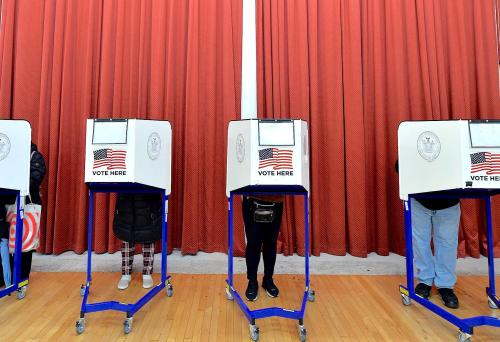Executive Summary
The catchword of the 2008 presidential election is “Change.” Barack Obama runs as the candidate of “change you can believe in.” So does John McCain, who proclaims that “change is coming.”
But how much real change will there be after January 20? Probably a good deal less than the campaigns assert. Their promises to makeover Washington, with ambitious new agendas, will most likely run afoul of old political realities: well-organized naysayers, partisan polarization in Congress, obstructionism in the Senate, bureaucratic inertia, an enigmatic Supreme Court, independent-minded state governments, a public that naturally likes a free lunch, a mostly non-discretionary budget, and of course, the rest of the world’s propensity to constrain America’s options. Further, for the first time since 1961, a sitting senator will be the next president. Whatever else his Senate experience (however long or short) imparts, it doesn’t amount to much of an executive education. The learning curve, in other words, will be steep. In addition, contrary to the belief of many critics, objective historians won’t write off the eight years of George W. Bush as a failed and forgettable interregnum. Despite various blunders, notable accomplishments happened on his watch, sometimes in the face of great adversity. Regardless of who takes office next year, parts of the Bush legacy will be extended, even emulated.
Granted, an unexpected crisis, a realigning election, or an exceptional display of executive prowess, could toss our assessment into a cocked hat. We suspect, however, that at least the last two of those preconditions have rather long odds. The woes of the Republican Party are many, but an electoral tsunami akin to those in 1932, 1964 or 1980 remains unlikely. Equally improbable is the prospect that either party’s nominee can easily morph into a transformational public manager.
The following essay proceeds in five steps. First, we discuss the institutional context and historical perspective through which to view realistically the jobs ahead for the competing change agents, Obama and McCain. In two subsequent sections, we examine probable policy outcomes, first at home and then abroad, of an Obama or a McCain presidency, and consider the extent to which they would depart from existing baselines. Fourth, the paper offers a few reflections regarding the kinds of political circumstances that historically have been propitious for large-scale policy changes, and about a factor further complicating the prospect this time: the senatorial backgrounds of the two contenders. We then conclude with a brief summary of our principal observations.
The Brookings Institution is committed to quality, independence, and impact.
We are supported by a diverse array of funders. In line with our values and policies, each Brookings publication represents the sole views of its author(s).


